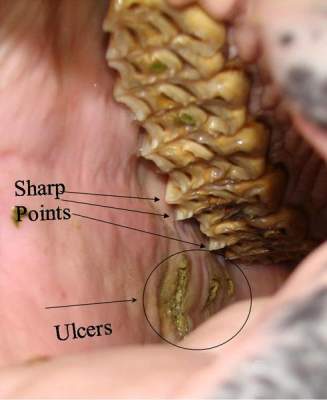At Mid-Rivers Equine Centre, we provide a full range of equine dentistry from routine floating and extractions to repairing fractured jaws. We have a full range of diagnostic equipment and a fully equipped surgical suite on the premises to address any dental problem that may arise.

Annual Floating Removes Sharp Points On The Teeth That Cut The Inside Of The Mouth.
Why Dental Care?
Routine and early dental care plays a vital role in your horse’s long-term health. The first dental exam should take place during the foal’s first wellness exam. After that, annual exams should be scheduled to closely monitor your horse‚Äôs dentition.
Routine floating and annual exams are by far the most important factor in prolonging your horse’s life from a dental standpoint. Annual exams ensure early detection of problems like ulcers, hooks, caps, fractures, abscess, waves, inclusions, and diastema for prompt attention and appropriate treatment. This does not mean that your horse’s teeth will need to be floated at every exam, but identifying a problem early allows for quick intervention.
Horses often live into their 20’s and 30’s and their teeth continuously erupt throughout their lifetime. Some older horses can actually outlive their teeth and have to be on diets that address a decreased ability to chew forage. This problem introduces a special challenge, as these horses still need adequate nutrition, which means we will have to provide basic maintenance calories and nutrients in a form that is easy to digest and readily absorbable. This often means pelleted complete feeds.
Equine Dentistry Services Provided
At Mid-Rivers Equine Centre, we offer the following equine dentistry services and address the following dental problems:
- Cap removal
- Closed diastema (gaps between teeth) therapy
- Dentigerous cyst identification and extraction
- Floating to remove sharp points and bit seats
- Fractured maxillary and mandibular bone repairs
- Hook reductions (associated with parrot or monkey mouth)
- Identification and treatment of TMJ issues
- Oral extraction of infected or decayed cheek teeth
- Oral ulcer treatment
- Plaque removal
- Ramp reductions
- Root canals
- Supernumerary teeth extractions
- Surgical extraction by repulsion of infected and decayed cheek teeth
- Wolf teeth extractions
Poor Dental Health Can Affect Your Horse’s Behavior
A horse’s attitude and performance can also be adversely affected by dental problems that are left untreated. Horses that once behaved and rode well may now shake their heads, rear, or balk at the bit. If your horse is displaying these behaviors, it is important to get their dental health checked to rule out any problems.